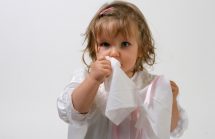Infectious Disease

Avoiding Salmonella – Guidelines for Handling Reptiles as Pets
Dr. Greene's advice on how to avoid salmonella when you have reptiles as pets: As a child, I enjoyed keeping pet turtles, frogs, lizards, and snakes (and many, more cuddly, pets). But some children wh…

Tips For Cold, Cough, or Flu Prevention
Infections can be avoided both by decreasing the exposure to germs and by boosting your child's immunity. Here are 6 powerful ways to decrease germ exposure: (more…)…

Guidelines for Antibiotic Use
Recognizing the urgent problem of antibiotic overuse, in 1998 the Centers for Disease Control and the Academy of Pediatrics have issued guidelines for when to use (and when not to use) antibiotics for…

Cold Or Flu? How To Tell The Difference
Dr. Greene's take on how to distinguish: cold or flu? The symptoms we get during a viral illness are often the body's attempt to get rid of the virus and to minimize damage. Sneezing ejects the virus …

Fast Facts about Pertussis
Pertussis is commonly known as whooping cough. Pertussis is caused by bacteria that attach themselves to the cilia (little hairs) that line the respiratory tract. These bacteria produce a potent toxin…

Colds, Allergies and Sinus Infections
Parents often ask me whether their children's constantly runny noses are the result of allergies, sinus infections, or of one cold after another. (more…)…

Fast Facts about Febrile Seizures
Some children have seizures or convulsions when they have fevers. Febrile seizures occur in 3% to 5% of otherwise healthy children between the ages of 6 months and 5 years. Toddlers are the most commo…

Fast Facts about Fevers
Dr. Greene's take on fevers... Most bacteria and viruses that cause infections in humans thrive best at 98.6 degrees F (37C). Raising the temperature a few degrees can give the body the winning edge. …

Fast Facts about Group A Strep
More than 100 different types of Group A Strep have been identified. (more…)…

Fast Facts about the Chickenpox Vaccine
Chicken pox is caused by the Varicella-zoster virus. It is usually a mild infection, and not life-threatening. Although children with this virus may be miserable for several days, and miss a week of s…
